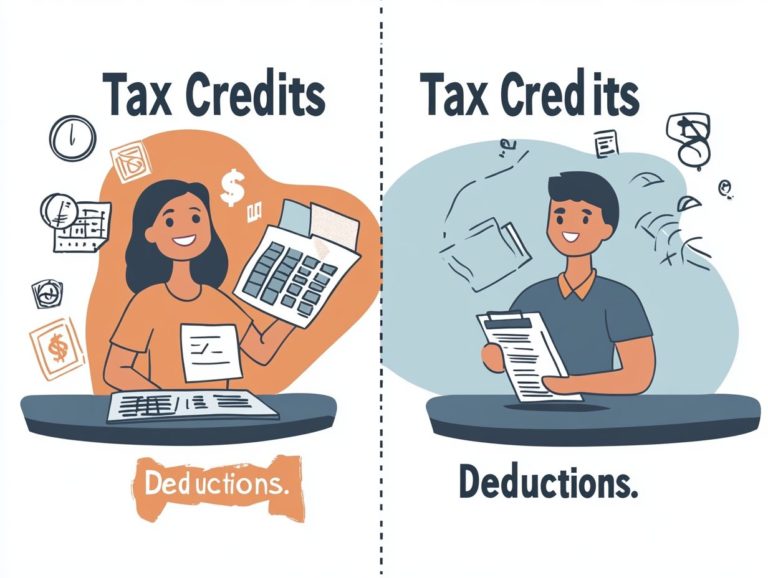Best Practices for Managing Debt?
Managing debt can feel like a daunting task, but it doesn t have to be. With the right strategies in your toolkit, you can take charge of your financial landscape and pave the way toward a debt-free future.
This guide presents essential best practices, starting with a clear understanding of your current debt and culminating in a realistic repayment plan tailored to your needs.
Whether it s negotiating with creditors or trimming unnecessary expenses, these insights will empower you to regain your financial stability and confidence.
Explore actionable steps and valuable insights that will elevate your approach to effective debt management.
Contents
- Key Takeaways:
- 1. Understand Your Current Debt Situation
- 2. Create a Budget and Stick to It
- 3. Prioritize Your Debts
- 4. Negotiate with Creditors
- 5. Consider Debt Consolidation
- 6. Avoid Taking on Additional Debt
- 7. Seek Professional Help if Needed
- 8. Keep Track of Your Progress
- 9. Cut Expenses and Increase Income
- 10. Avoid Using Credit Cards
- 11. Stay Organized and Keep Records
- 12. Don’t Ignore Your Debt
- 13. Communicate with Creditors
- 14. Educate Yourself on Debt Management
- 15. Don’t Be Afraid to Ask for Help
- What Are the Common Causes of Debt?
- Frequently Asked Questions
- What are the best practices for managing debt?
- How can creating a budget help with managing debt?
- Why is it important to prioritize high interest debts?
- How can negotiating with creditors help with managing debt?
- Is it okay to take on more debt while managing current debt?
- When should I seek professional help for managing debt?
Key Takeaways:

- Understand your current debt situation to effectively manage it.
- Create and follow a budget to stay on track with debt repayment.
- Prioritize debts and negotiate with creditors to find manageable solutions.
1. Understand Your Current Debt Situation
Understanding your current debt situation is the essential first step toward mastering effective debt management. It involves taking a good look at all the money you owe student loans, credit card debt, and other high-interest loans.
By analyzing your credit report, you’ll uncover your credit history and gain valuable insights into your spending habits and monthly payments. This comprehensive overview shines a light on areas of financial strain and gives you the power to make informed decisions that align with your financial goals.
It lays a solid foundation for reducing your debt, including high-interest loans and credit card debts. To gather the necessary financial documents, like bank statements, loan agreements, and income records, create a well-organized filing system, whether digitally or physically.
Regularly reviewing your credit reports is crucial; ensure all entries are accurate and promptly dispute any discrepancies. Assessing the total amount of your debt helps you distinguish between good debt and bad debt, a key factor for your long-term financial health.
Good debt, such as mortgages or educational loans, typically contributes to asset growth, while bad debt, like high-interest credit cards, can impede your financial progress. You can prioritize repayments by differentiating between good and bad debt, which allows you to strategize your future financial endeavors effectively.
2. Create a Budget and Stick to It
Creating a budget is your ticket to financial freedom! It s crucial for managing your expenses and ensuring you can meet your financial obligations while diligently working towards reducing debt.
By leveraging various budgeting tools, you can adopt a systematic approach to categorize your expenses effectively. This gives you clear visibility into where your money flows each month.
Whether you opt for mobile applications or spreadsheet templates, these resources simplify tracking monthly payments, making it easier to stay on top of bills and curb overspending.
While sticking to a budget is vital, life often throws unexpected expenses your way. Therefore, it is essential to remain flexible and adjust your plans as needed. This ensures that your financial goals stay within reach and your stress levels remain manageable.
3. Prioritize Your Debts
Prioritizing your debts is an essential step in your repayment strategy. It enables you to concentrate on high-interest loans that weigh heavily on your finances.
Utilizing techniques like the debt avalanche and debt snowball methods allows you to customize your approach to reduce your debt effectively. The debt avalanche method suggests tackling the debts with the highest interest rates first, significantly lowering the total interest you pay over time.
Conversely, the debt snowball method emphasizes clearing the smallest debts first. This offers quick wins that boost your motivation and instills a sense of accomplishment.
This deliberate prioritization aligns with your personal financial goals and reinforces positive financial habits, paving the way for a more secure financial future.
4. Negotiate with Creditors
Negotiating with your creditors can pave the way for favorable payment plans and even potential debt relief, especially when you find yourself overwhelmed by debt issues.
Establishing open lines of communication is essential during these discussions. Approach debt collectors with a calm demeanor, clearly outlining your financial situation while expressing your willingness to find a mutually beneficial agreement. Act now to negotiate better terms before your debts pile up further!
Requesting lower interest rates or reductions on high fees can often yield positive outcomes, especially when your requests are supported by documentation of prior payments and your current financial hardships.
Keep detailed records of all interactions, including agreements reached and any commitments made. This not only ensures accountability but also provides you with a valuable reference for future negotiations.
5. Consider Debt Consolidation
Debt consolidation can be your ticket to simplifying your finances by combining several high-interest loans into a single, more manageable payment with a lower interest rate. This strategy not only streamlines your financial management but can also lead to substantial savings over time.
You have various debt consolidation options at your disposal, including:
- Personal loans, which typically provide a one-time lump sum to pay off existing debts.
- Debt management plans, where you work with a credit counseling agency to negotiate lower interest rates and establish a structured repayment plan.
To determine which option suits you best, it’s essential to carefully assess your financial circumstances, including your income, expenses, and credit score. These factors greatly affect the effectiveness and feasibility of your chosen debt consolidation strategies.
6. Avoid Taking on Additional Debt
Avoiding additional debt is crucial for staying on track with your finances. Taking on new expenses can stall your progress toward achieving financial stability.
To navigate this challenge, you can adopt several strategies that help minimize the temptation to reach for credit cards during impulsive moments. Regularly assessing your spending patterns becomes crucial, as it helps you differentiate between necessary purchases and those sparked by fleeting desires.
This self-awareness gives you the power to make more informed financial decisions and encourages you to save for larger, meaningful expenses instead. It’s also important to distinguish between good and bad debt; while certain debts, such as student loans or mortgages, can bolster your financial health, others like high-interest credit card balances risk dragging you down.
By cultivating mindfulness around your spending habits, you can gain greater control over your financial future.
7. Seek Professional Help if Needed

Seeking professional assistance from financial advisors or credit counselors can offer you invaluable guidance in creating a tailored debt management plan that aligns with your unique circumstances, possibly even leading to loan forgiveness.
These experts bring a wealth of knowledge and experience, expertly navigating the complexities of financial challenges. Credit counseling services give you the power to understand your credit reports better, budget more effectively, and even negotiate with creditors on your behalf. Meanwhile, financial planners can thoroughly assess your overall financial health, recommend investment strategies, and help you establish a clear pathway toward financial recovery.
By collaborating with these professionals, you can develop a customized debt relief strategy that addresses your immediate concerns while laying a solid foundation for a more secure financial future, including the establishment of an emergency fund.
8. Keep Track of Your Progress
Keeping track of your progress is crucial for effective debt management. This ensures you stay on the right path toward your financial goals.
Utilize tools like spreadsheets or specialized apps to simplify this process. By visualizing your debt reduction journey, you can input your monthly payments and remaining balances to easily see how your debts diminish over time.
Regularly monitoring changes in your credit scores a number that shows how reliable you are with money alongside tracking monthly expenses, provides valuable insights. This data enables you to adjust your payment strategy, prioritizing high-interest debts those that charge you extra money if not paid off quickly or pinpointing areas to cut back on expenses.
Such proactive management fosters accountability and boosts your confidence in achieving financial freedom while reaching your wealth-building objectives.
9. Cut Expenses and Increase Income
Cutting expenses and actively seeking ways to increase your income are powerful strategies for enhancing your financial situation and building a robust emergency fund.
Examine your everyday spending habits to pinpoint areas where you might be overspending. Are those frequent dinners out or endless subscription services worth it? Budgeting tools whether sleek mobile apps or good old-fashioned spreadsheets can streamline tracking your expenses and reveal overlooked saving opportunities.
Embrace lifestyle changes, like meal prepping or opting for public transport, to dramatically improve your finances! Explore side jobs or freelance gigs that align with your skills and passions. You can transform hobbies into profitable ventures, perfectly complementing your primary source of revenue.
10. Avoid Using Credit Cards
Avoiding the use of credit cards can be a game-changer in your journey to mitigate debt and manage your financial responsibilities more effectively.
Steering clear of these financial tools safeguards you against high-interest charges that often come with outstanding balances. Many individuals find themselves entangled in debt cycles, where monthly payments barely scratch the surface of the principal, merely covering the interest.
The allure of overspending can lead to financial strain and overwhelming stress. Instead of relying on credit cards, craft a budget that prioritizes essential expenses. Explore alternatives like prepaid cards or personal savings accounts. These options help limit overspending and foster responsible financial habits that can serve you well in the long run.
11. Stay Organized and Keep Records
Staying organized and maintaining comprehensive records of your financial situation greatly enhances your ability to manage debt effectively and make informed decisions.
Diligently tracking your expenses and regularly updating your financial documents empowers you to understand your spending habits and pinpoint areas for improvement. Utilize budgeting tools for a clear visual representation of income versus expenditures.
It s beneficial to categorize your expenses into fixed and variable costs. Keep digital or physical folders for different types of records, such as receipts, bills, and bank statements. This practice can aid in managing credit card bills effectively.
Regularly reviewing these records prepares you for tax season and helps evaluate your financial goals, ensuring you can make sound decisions with confidence.
12. Don’t Ignore Your Debt
Ignoring your debt can spiral into escalating financial distress, leading to serious repercussions as debt collectors relentlessly pursue outstanding payments.
This oversight tarnishes your credit score, complicating future loans and purchases. It can seep into your life, causing anxiety and stress that touch nearly every aspect of your daily routine.
Taking a proactive stance on your debt issues sets the stage for a more manageable financial landscape, offering the peace of mind that comes with a solid payment plan. By confronting your debt head-on instead of letting it linger, you open the door to negotiating settlements or restructuring your obligations. To effectively tackle your debt, consider learning how to create a debt repayment plan, ultimately reclaiming control over your financial well-being.
13. Communicate with Creditors
Effective communication with creditors is essential for managing your financial obligations. It can open doors to better payment strategies and terms.
By entering these discussions well-prepared and with clarity, you can explore a variety of payment options tailored to your financial situation. When you discuss your specific budget limits openly, creditors gain a better understanding of your circumstances, leading to more flexible arrangements.
Clearly outlining your desired terms while being ready to negotiate is crucial. Maintaining a calm and respectful demeanor can significantly impact the outcome. If disputes arise, addressing them professionally armed with documented evidence and a solution-focused mindset can help resolve issues amicably and foster a more cooperative relationship with your creditors.
14. Educate Yourself on Debt Management

Educating yourself on the fundamentals of debt management is crucial. It helps you navigate your financial landscape and make informed decisions that foster wealth building.
With several resources at your fingertips, you can significantly enhance your financial literacy. Local community centers and financial institutions often host workshops that provide valuable hands-on experience and expert guidance.
You’ll discover an impressive selection of books, ranging from basic to advanced debt strategies, available at libraries or online. Each offers invaluable insights into effective money management.
Online courses are available, many of which are free or low-cost. These allow you to tailor your education to fit your schedule seamlessly and potentially offer insights into wealth creation through money management.
Embracing continuous learning helps you tackle current challenges and equips you with essential skills for long-term financial stability.
15. Don’t Be Afraid to Ask for Help
Don’t hesitate to seek help when managing your debt! Engaging with financial advisors or credit counselors can provide the essential support you need to take charge of your finances.
By seeking professional guidance, you can lay the foundation for a solid debt management plan tailored to your unique circumstances. This approach leads to more manageable payments and a clearer financial future.
Taking proactive steps helps you organize your monthly expenses. It also alleviates the anxiety and stress that often accompany financial struggles.
The emotional benefits are significant when you reach out for support. Sharing your worries with knowledgeable professionals fosters a sense of community and diminishes feelings of isolation.
Having a strong support system encourages accountability, giving you the power to stay on track during this crucial journey toward recovery.
What Are the Common Causes of Debt?
Common causes of debt can vary widely. They range from unexpected medical expenses to the weight of consumer debt, often compounded by high-interest loans and unplanned financial obligations.
For example, a sudden job loss can thrust households into financial turmoil. This leaves you scrambling to meet everyday expenses without a steady income.
A lack of budgeting skills can lead to overspending, especially when consumer temptations are high. Financial emergencies, such as car repairs or home maintenance, can tighten the screws even further, particularly if savings are running low.
To navigate these challenges, it s vital to establish a realistic budget, prioritize savings, and build an emergency fund. These strategies can serve as a financial cushion during tough times, helping you maintain stability when life throws you a curveball.
How Can One Avoid Falling into Debt?
Avoiding the pitfalls that can lead you into debt requires leveraging budgeting tools and diligently tracking your expenses. Establish clear financial goals to stay on track.
Review your budget each month to improve your financial health. Ensure it reflects any changes in your income or expenses. Regularly monitoring your credit reports documents that show your borrowing history is essential. It keeps you informed about your credit health and helps you identify potential errors early on.
Set achievable financial targets, such as saving a specific amount each month or cutting back on unnecessary subscriptions. This focus can keep you aligned with your long-term objectives and pave the way for a more resilient financial future.
What Are the Benefits of Managing Debt Effectively?
Effectively managing your debt brings many benefits, such as improved credit scores and enhanced emotional well-being.
When you take control of your debts, you’re not just setting the stage for a healthier financial future; you’re also unlocking potential avenues for wealth creation.
This proactive approach transforms your finances from a source of anxiety into a solid foundation for success. It makes it easier for you to invest in education, property, or retirement plans.
By reducing financial burdens, you significantly decrease stress. This can create a positive ripple effect on your personal relationships and overall health. Embracing sound debt management strategies gives you the power to enjoy a more stable and prosperous life.
How Can One Create a Realistic Debt Repayment Plan?
Creating a realistic debt repayment plan demands a comprehensive evaluation of your financial landscape. This includes assessing monthly payments and current expenses to ensure sustainability.
This assessment helps you identify which debts deserve your immediate attention based on their interest rates and outstanding balances.
Once you’ve established your priorities, determine what monthly contributions you can comfortably make without sacrificing essential living expenses.
Employ budgeting tools whether sophisticated apps or simple spreadsheets. These offer a clear picture of fund allocation and facilitate progress tracking over time.
These strategies instill a sense of accountability and provide a motivational lift when you hit key milestones. This flexibility allows you to make necessary adjustments as your financial situation evolves, ensuring that your repayment journey remains on course.
What Are the Consequences of Not Managing Debt?
Failing to manage your debt can lead to significant financial distress. This includes declining credit scores, persistent harassment from debt collectors, and an increasing dependence on high-interest loans.
This neglect can also create emotional turmoil, resulting in a cycle of anxiety and worry that seeps into your personal relationships and overall well-being.
Over time, such financial mismanagement can severely restrict your future opportunities. It may become difficult to secure favorable terms on mortgages or car loans.
As the weight of overwhelming debt grows heavier, you might find yourself ensnared in a relentless struggle. This hinders your ability to save for retirement or invest in personal development.
Ultimately, without taking proactive steps to address your financial situation, you risk facing an unstable future filled with uncertainty.
Frequently Asked Questions

What are the best practices for managing debt?
1. Create a budget and stick to it: A budget helps you track your expenses. This way, you can avoid overspending and reduce your debt.
2. Prioritize high interest debts: Make sure to pay off high interest debts first to avoid accumulating more interest and to save money in the long run.
3. Make timely payments: Late payments lead to late fees and negatively impact your credit score. It s important to make payments on time.
4. Struggling to make payments? Don’t hesitate to negotiate with your creditors for better terms!
5. Avoid taking on more debt: As you work towards paying off your current debt, avoid taking on more debt to prevent further financial strain.
6. If you feel overwhelmed by debt, seek help from a financial advisor. They can give you personalized guidance and assistance.
How can creating a budget help with managing debt?
Creating a budget allows you to have a clear understanding of your income and expenses. It helps you identify areas where you can cut back on spending and save more money to put towards your debt repayment, ultimately building an emergency fund for unexpected expenses.
Why is it important to prioritize high interest debts?
Paying off high interest debts saves you money over time. It helps you reduce interest accumulation and get debt-free quicker.
This strategy is crucial for improving your credit history and achieving financial stability.
How can negotiating with creditors help with managing debt?
Negotiating with creditors can lower interest rates and reduce late fees. This makes it easier to pay off your debt and save money.
You might also explore debt settlement, which means settling for less than you owe, or debt consolidation, which combines your debts into one loan.
Is it okay to take on more debt while managing current debt?
It’s best not to take on more debt while paying off what you owe. Focusing on your current debts will make it easier to become debt-free.
New debts, like credit cards and student loans, can come with high fees that add to your financial strain.
When should I seek professional help for managing debt?
If managing your debt feels overwhelming, it s time to consult a financial advisor. They can help create a personalized plan to pay off debt and improve your finances.
This may include options for loan forgiveness or a tailored debt management plan to fit your financial obligations.






